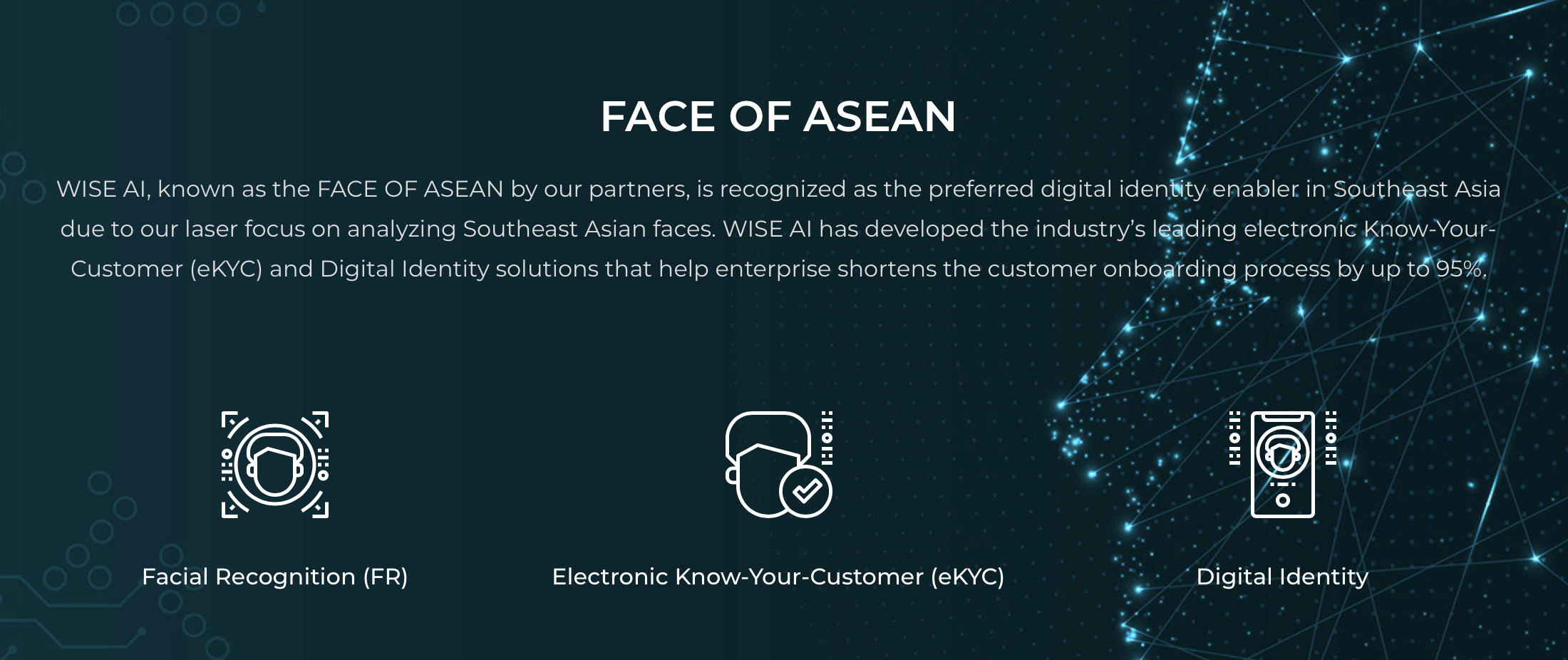Identity Review | Global Tech Think Tank
Keep up with the digital identity landscape.
WISE AI, a Malaysian-based facial recognition and eKYC startup, has been making waves in the digital identity space. The startup recently closed a seed funding round led by Sun SEA Capital, the venture capital division of the Malaysian conglomerate Sunway Group.
As part of our profile series on up-and-coming CEOs in the digital identity space, Identity Review interviewed Wise AI Chief Executive Officer David Lim to better understand his vision for the company and how it could impact the future of digital identity.
Before diving into the details of our conversation with Lim, it’s important to understand WISE AI’s product offerings. WISE AI has three products: facial recognition, eKYC and a digital ID. WISE AI’s facial recognition focuses on accurately identifying Southeast Asian faces, and according to the company site, its eKYC process can reduce onboarding times by up to 95%.

Source: wiseai.tech
Privacy is a top priority to WISE AI. WISE AI follows the ISO standards for data privacy and protection and routinely conducts penetration tests, vulnerability tests, and other cybersecurity assessments to ensure that its data storage mechanisms are safe.

David Lim, Co-Founder and CEO of WISE AI
Lim’s pathway to founding and scaling WISE AI, which he describes as a similar experience to “jumping out a plane trying to catch a parachute in mid air,” was not linear. He began his career in London working to help asylum seekers find refuge in the UK, before becoming a finance manager for a publicly-listed cash management company in London. His most recent job prior to founding WISE AI was as CEO of a local startup in Kuala Lumpur, Malaysia, which focused on digital marketing and platform development.
The idea behind WISE AI was born out of Lim’s desire to solve a problem he experienced firsthand. Lim had driven through heavy traffic to a local bank to open a savings account before realizing once he arrived that he left his identification cards at home.
When the bank refused to open an account for Lim without his cards, he realized that lack of credible digital identification created a tangible business opportunity: “That was when I knew this is a problem which ought to be solved and can be solved via digital identity.”
It turns out that Lim’s struggles to open a bank account generalize to larger identity verification problems in Southeast Asia: “Current identity verification processes makes services costly and inaccessible for people, especially in Southeast Asia,” Lim told Identity Review.
WISE AI is hoping to change this paradigm and is targeting a diverse set of verticals.
“From getting a loan or credit instantly approved and receiving incentives from [the] government in under a minute, to using [facial recognition] to make payment[s], electronic identity verification [can be used] for all services.”
With the digital identity market globally projected to be worth over $30 billion in 2024 (with Southeast Asian alone at nearly $12 billion), market size is not an issue for WISE AI.
Regional focus is a core part of WISE AI’s moat. The startup has offices in Malaysia, Singapore and Thailand, and focuses exclusively on Southeast Asia. Lim argues the region will see an influx of digital identity solutions in the coming decade: “Digital identity will unlock tremendous opportunities across all industries in Southeast Asia in the next 10 years.”
We asked Lim what differentiated WISE AI from previous digital identity solutions in Southeast Asia that failed to gain traction, and he named three key factors.
First, WISE AI is focusing only on Southeast Asia and being the “Face of ASEAN.” Given the regulatory and cultural differences in every country, this focus is a distinct advantage. Moreover, many facial recognition technologies struggle to identify Asian faces due to biased training data, a problem WISE AI avoids with an explicit focus on Southeast Asian faces.
Second, WISE AI’s productized services means that the company is able to balance customization with fast deployment. Lim noted that “since we own the full-fledged eKYC technologies, we are able to localize and customize our product offerings for partners in each country with a cost-efficient approach.”
Finally, Lim believes that the pandemic has had an effect, as “COVID-19 has certainly accelerated the urgency to adopt digital solutions.” As governments increase assistance to their citizens and more citizens transact online, improving digital identity solutions is essential for promoting financial inclusion and reducing identity fraud.
When we asked WISE AI if they planned to partner with governments in the future, Lim gave us a simple answer: “Yes.”
WISE AI’s decision to work with governments means that how Southeast Asian countries regulate digital identity solutions will have a significant effect on their business.
In a promising sign for the future of digital ID solutions in Southeast Asia, Malaysia’s central bank published a report this June encouraging companies to adopt eKYC solutions, a core focus of WISE AI. Singapore recently announced National Digital Identity (NDI), which will provide each citizen a unique digital ID that they can use to transact and manage their personal information.
These regulatory tailwinds will ease adoption of WISE AI’s eKYC technology, and allow the team to focus more on scaling its product than lobbying government officials for regulatory changes.
WISE has a bold mission: to “provide digital identity to all the people in [Southeast Asia] and unlock billion dollar opportunities in providing consumers with instant access to services.”
With its new funding, the startup plans to expand its eKYC platform across Southeast Asia. As they expand, WISE AI will compete with well-funded competitors in the space like Wee Digital and Computer Vision Vietnam.
There will be a winner in the rapidly growing digital identity space in Southeast Asia, but who that winner will be is still unclear. We will be monitoring WISE AI’s progress in the region in the years to come.
ABOUT THE WRITER
Quinn Barry is a Tech Innovation Fellow from Stanford University covering innovations in digital privacy across finance and government.
Contact Quinn Barry at quinn@identityreview.com.
Do you have information to share with Identity Review? Email us at press@identityreview.com.